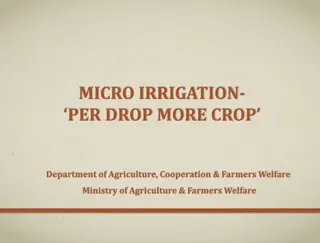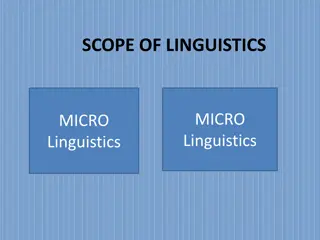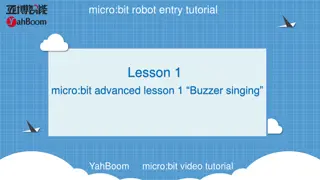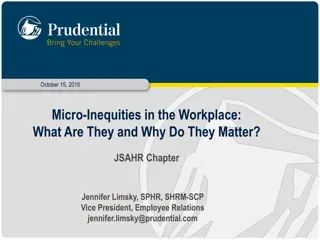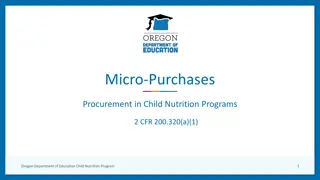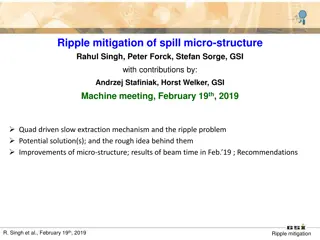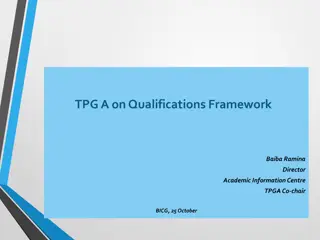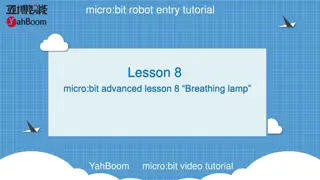
Microeconomics Review Schedule and Topics
Explore the detailed schedule and topics covered in the AP Microeconomics review sessions, including elasticity, profit, market structure, and more. Get insights on market failure, self-assessment tasks, student reviews, practice exercises, and upcoming mid-term exam information.
Uploaded on | 687 Views
Download Presentation

Please find below an Image/Link to download the presentation.
The content on the website is provided AS IS for your information and personal use only. It may not be sold, licensed, or shared on other websites without obtaining consent from the author. If you encounter any issues during the download, it is possible that the publisher has removed the file from their server.
You are allowed to download the files provided on this website for personal or commercial use, subject to the condition that they are used lawfully. All files are the property of their respective owners.
The content on the website is provided AS IS for your information and personal use only. It may not be sold, licensed, or shared on other websites without obtaining consent from the author.
E N D
Presentation Transcript
Housekeeping Bring books to class. Morning review sessions 7:15-7:45 Current event assignment - Thursday
Overview 1. Elasticity DWL 2. Profit & Pure Competition 3. Monopoly & Oligopoly 4. Factor Markets 5. Market Failure
Market failure FRQ Mark David Marvin Yucin Christina Also pollution homework Rahul and Ashwini
Today Self assessment in micro concepts. Return & review comparative advantage quiz. Work on elasticity and DWL
Student Review 1. Income and substitution effects 2. Price elasticity 3. Determinants of price elasticity 4. Income elasticity normal and inferior goods 5. Cross price elasticity complements & substitutes 6. Supply elasticity - determinants of supply elasticity
Summary Elastic vs. inelastic parts of demand curve Elasticity and firm revenue Cross price complements vs. substitutes Income elasticity inferior vs. superior. Producer and consumer surplus DWL under tax or quota
AP Econ Micro Review Day 2 Profit and Pure Competition
Do Now Create an example of an accounting profit. Expand the example to show an economic profit.
Individual Practice Graph a firm under pure competition showing a short term profit. Graph firm under pure competition in the long-run.
Mid-Term Info Thursday 2/6 12:30 to 2:00 p.m. Period 3 Room D265 Period 5 Room D264
Reminder Test reviews C 250 7:15 7:45 a.m. 2:45 3:30 p.m. Bring competition, monopoly, oligopoly, and factor tests.
Profit and Pure Competion Do problems
Summary Accounting vs. economic profits (opportunity cost) Normal economic profit Optimal output rule: MR=MC Lowest cost output: ATC at min.
Summary Shutdown price: P<AVC Breakeven price: P=ATC Long run equilibrium under pure competition: P=MC=ATC Productive and allocative efficiency
AP Econ Micro Review Day 3 Monopoly and Oligopoly
Mid-Term Info Thursday 2/6 12:30 to 2:00 p.m. Period 3 Room D265 Period 5 Room D264
Reminder Test reviews C 250 7:15 7:45 a.m. 2:45 3:30 p.m. Bring competition, monopoly, oligopoly, and factor tests.
Summary Accounting vs. economic profits (opportunity cost) Normal economic profit Optimal output rule: MR=MC Lowest cost output: ATC at min.
Summary Shutdown price: P<AVC Breakeven price: P=ATC Long run equilibrium under pure competition: P=MC=ATC Productive and allocative efficiency
Class Relay Industry structure matrix # of firms Uniform or differentiated Price make or taker Non-price competition Long-term profitability excess or normal
Oligopoly & Monopolistic Compeption Problems
Student Summary 1. Monopoly pricing and elasticity 2. Monopoly regulation 3. Oligopoly Cournot vs. Bertrand 4. Oligopoly strategic behavior 5. Monopolistic competition short- term 6. Monopolistic competition long-term
Summary - Monopoly Monopoly MR=MC Price on elastic part of the demand curve Regulate to MC=P unless there is a loss. If loss, fair return price = ATC = normal profit
Summary - Oligopoly Oligopoly collusion or competition Collusion similar to monopoly Competition similar to pure competition Game theory Nash equilibrium (non-cooperation) Prisoners dilemma (perils of cooperation) Strategic behavior tit for tat, price leadership.
Summary Monopolistic Comp Differentiation = downward sloping demand Long-term equilibrium ATC = P = normal profit Not allocatively efficient. P>MC Not productively efficient excess capacity.
Cramer on Oligopoly Oligopoly
AP Econ Micro Review Day 4 Factor Markets
Mid-Term Info Thursday 2/6 12:30 to 2:00 p.m. Period 3 Room D265 Period 5 Room D264
Summary - Monopoly Monopoly MR=MC Price on elastic part of the demand curve Regulate to MC=P unless there is a loss. If loss, fair return price = ATC = normal profit
Summary - Oligopoly Oligopoly collusion or competition Collusion similar to monopoly Competition similar to pure competition Game theory Dominant strategy (works in all scenarios) Nash equilibrium (non-cooperation) Prisoners dilemma (perils of cooperation) Strategic behavior tit for tat, price leadership.
Summary Monopolistic Comp Differentiation = downward sloping demand Long-term equilibrium ATC = P = normal profit Not allocatively efficient. P>MC Not productively efficient excess capacity.
Factor Markets Major Ideas 1. Optimal mix 2. Profit maximizing mix 3. Pure competition model 4. Monopoly model 5. Monopsony model 6. Income inequality
Final Exam Review 61 points total 11 points for FRQ 50 points for MC + 2 point adjustment to points earned.




